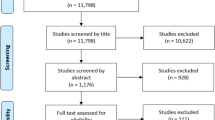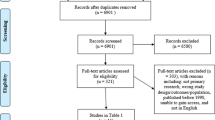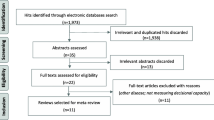Abstract
Individuals with serious mental illness (SMI) experience significant premature mortality due to somatic conditions but often receive sub-optimal somatic care, but little research has been done to understand how general medical clinicians’ attitudes may affect care provision or health outcomes. This review describes general medical clinicians’ attitudes toward people with SMI, compares these attitudes to attitudes among mental health clinicians or toward individuals without SMI, and examines the relationship between attitudes and clinical decision making. Seventeen studies were reviewed. General medical clinicians reported negative attitudes toward individuals with SMI. These attitudes were generally more negative than attitudes among mental health clinicians and were consistently more negative when compared to attitudes toward individuals without SMI. Four studies suggest that these negative attitudes have an adverse effect on clinician decision making.

Similar content being viewed by others

Explore related subjects
Discover the latest articles and news from researchers in related subjects, suggested using machine learning.References
Daumit G, Anthony C, Ford DE, et al. Pattern of mortality in a sample of maryland residents with severe mental illness. Psychiatry Research. 2010;176(2–3):242–245.
Olfson M, Gerhard T, Huang C, et al. Premature mortality among adults with schizophrenia in the United States. JAMA Psychiatry. 2015;72(12):1172–1181.
Parks J, Svendsen D, Singer P, et al. Morbidity and Mortality in People with Serious Mental Illness. Alexandria: National Association of State Mental Health Program Directors (NASMHPD) Medical Directors Council 2006.
Lawrence D, Kisely S. Inequalities in healthcare provision for people with severe mental illness. Journal of Psychopharmacology. 2010;24(4 Suppl):61–68.
Newcomer JW, Hennekens CH. Severe mental illness and risk of cardiovascular disease. Journal of the American Medical Association. 2007;298:1794–1796.
Sajatovic M, Dawson NV. The emerging problem of diabetes in the seriously mentally ill. Psychiatria Danubina. 2010;22 Suppl 1:S4–5.
McGinty EE, Baller J, Azrin ST, et al. Quality of medical care for persons with serious mental illness: A comprehensive review. Schizophrenia Research. 2015;165(2–3):227–235.
Carney CP, Jones LE. The influence of type and severity of mental illness on receipt of screening mammography. Journal of General Internal Medicine. 2006;21(10):1097–1104.
Desai MM, Rosenheck RA, Druss BG, et al. Mental disorders and quality of diabetes care in the veterans health administration. American Journal of Psychiatry. 2002;159(9):1584–1590.
Kisely S, Campbell LA, Wang Y. Treatment of ischaemic heart disease and stroke in individuals with psychosis under universal healthcare. The British Journal of Psychiatry. 2009;195(6):545–550.
Daumit GL, McGinty EE, Pronovost P, et al. Patient Safety Events and Harms During Medical and Surgical Hospitalizations for Persons With Serious Mental Illness. Psychiatric Services. 2016;67(10):1068–1075.
Pescosolido BA, Medina TR, Martin JK, et al. The “Backbone” of Stigma: Identifying the Global Core of Public Prejudice Associated With Mental Illness. American Journal of Public Health. 2013;103(5):853–860.
Cooper LA, Roter DL, Carson KA, et al. The associations of clinicians' implicit attitudes about race with medical visit communication and patient ratings of interpersonal care. American Journal of Public Health. 2012;102(5):979–987.
Haywood C, Jr., Lanzkron S, Bediako S, et al. Perceived discrimination, patient trust, and adherence to medical recommendations among persons with sickle cell disease. Journal of General Internal Medicine. 2014;29(12):1657–1662.
Sabin JA, Riskind RG, Nosek BA. Health Care Providers' Implicit and Explicit Attitudes Toward Lesbian Women and Gay Men. American Journal of Public Health. 2015;105(9):1831–1841.
Zestcott CA, Blair IV, Stone J. Examining the Presence, Consequences, and Reduction of Implicit Bias in Health Care: A Narrative Review. Group Processes & Intergroup Relations. 2016;19(4):528–542.
Green AR, Carney DR, Pallin DJ, et al. Implicit bias among physicians and its prediction of thrombolysis decisions for black and white patients. Journal of General Internal Medicine. 2007;22(9):1231–1238.
Hall WJ, Chapman MV, Lee KM, et al. Implicit Racial/Ethnic Bias Among Health Care Professionals and Its Influence on Health Care Outcomes: A Systematic Review. American Journal of Public Health. 2015;105(12):e60–76.
Milton AC, Mullan B. Views and experience of communication when receiving a serious mental health diagnosis: satisfaction levels, communication preferences, and acceptability of the SPIKES protocol. Journal of Mental Health. 2017;26(5):395–404.
Cunningham C, Peters K, Mannix J. Physical health inequities in people with severe mental illness: identifying initiatives for practice change. Issues in Mental Health Nursing. 2013;34(12):855–862.
Ljungberg A, Denhov A, Topor A. Non-helpful relationships with professionals–a literature review of the perspective of persons with severe mental illness. Journal of Mental Health. 2016;25(3):267–277.
Thornicroft G, Rose D, Kassam A. Discrimination in health care against people with mental illness. International Review of Psychiatry. 2007;19(2):113–122.
Henderson C, Noblett J, Parke H, et al. Mental health-related stigma in health care and mental health-care settings. The Lancet Psychiatry. 2014;1(6):467–482.
Pescosolido BA, Martin JK, Long JS, et al. “A Disease Like Any Other”? A Decade of Change in Public Reactions to Schizophrenia, Depression, and Alcohol Dependence. The American Journal of Psychiatry. 2010;167:1321–1330.
Colquhoun HL, Levac D, O'Brien KK, et al. Scoping reviews: time for clarity in definition, methods, and reporting. Journal of Clinical Epidemiology. 2014;67(12):1291–1294.
Substance Abuse and Mental Health Services Administration. Mental and Substance Use Disorders. https://www.samhsa.gov/disorders. 2017; Accessed 1/2/2018.
Star SA. The public's ideas about mental illness. 1955.
Arkar H. The social refusing of mental patients. Journal of Psychiatry and Neurological Sciences. 1991;4:6–9.
Eker D. Attitudes toward mental illness: Recognition, desired social distance, expected burden and negative influence on mental health among Turkish freshmen. Social Psychiatry and Psychiatric Epidemiology. 1989;24(3):146–150.
Crisp AH, Gelder MG, Rix S, et al. Stigmatisation of people with mental illnesses. The British Journal of Psychiatry. 2000;177(1):4–7.
Luty J, Fekadu D, Umoh O, et al. Validation of a short instrument to measure stigmatised attitudes towards mental illness. The Psychiatrist. 2006;30(7):257–260.
Üçok A, Soyguer H, Atakli C, et al. The impact of antistigma education on the attitudes of general practitioners regarding schizophrenia. Psychiatry and Clinical Neurosciences. 2006;60(4):439–443.
Hoshigoe K. A study of the social attitudes of psychiatic hospital staffs towards the mentally disabled in Kagawa Prefecture. Japanese Bulletin of Social Psychiatry. 1994;2:93–104.
Trute B, Tefft B, Segall A. Social rejection of the mentally ill: a replication study of public attitude. Social Psychiatry and Psychiatric Epidemiology. 1989;24(2):69–76.
Magliano L, Read J, Sagliocchi A, et al. “Social dangerousness and incurability in schizophrenia”: Results of an educational intervention for medical and psychology students. Psychiatry Research. 2014;219(3):457–463.
Link BG, Cullen FT, Frank J, et al. The social rejection of former mental patients: Understanding why labels matter. American Journal of Sociology. 1987;92(6):1461–1500.
Lawrie S, Martin K, McNeill G, et al. General practitioners’ attitudes to psychiatric and medical illness. Psychological Medicine. 1998;28(6):1463–1467.
Mukherjee R, Fialho A, Wijetunge A, et al. The stigmatisation of psychiatric illness. The Psychiatrist. 2002;26(5):178–181.
Noblett JE, Lawrence R, Smith JG. The attitudes of general hospital doctors toward patients with comorbid mental illness. The International Journal of Psychiatry in Medicine. 2015;50(4):370–382.
Jorm AF, Korten AE, Jacomb PA, et al. Attitudes towards people with a mental disorder: a survey of the Australian public and health professionals. Australian and New Zealand Journal of Psychiatry. 1999;33(1):77–83.
Rogers TS, Kashima Y. Nurses’ responses to people with schizophrenia. Journal of Advanced Nursing. 1998;27(1):195–203.
Hori H, Richards M, Kawamoto Y, et al. Attitudes toward schizophrenia in the general population, psychiatric staff, physicians, and psychiatrists: a web-based survey in Japan. Psychiatry Research. 2011;186(2):183–189.
Ishige N, Hayashi N. Occupation and social experience: Factors influencing attitude towards people with schizophrenia. Psychiatry and Clinical Neurosciences. 2005;59(1):89–95.
Aydin N, Yigit A, Inandi T, et al. Attitudes of hospital staff toward mentally ill patients in a teaching hospital, Turkey. International Journal of Social Psychiatry. 2003;49(1):17–26.
Corrigan PW, Mittal D, Reaves CM, et al. Mental health stigma and primary health care decisions. Psychiatry Research. 2014;218(1):35–38.
Mittal D, Corrigan P, Sherman MD, et al. Healthcare providers’ attitudes toward persons with schizophrenia. Psychiatric Rehabilitation Journal. 2014;37(4):297.
Sullivan G, Mittal D, Reaves CM, et al. Influence of schizophrenia diagnosis on providers' practice decisions. The Journal of Clinical Psychiatry. 2015;76(8):1068–1074; quiz 1074.
Smith JD, Mittal D, Chekuri L, et al. A comparison of provider attitudes toward serious mental illness across different health care disciplines. Stigma and Health. 2017;2(4):327.
Welch LC, Litman HJ, Borba CP, et al. Does a Physician’s Attitude toward a Patient with Mental Illness Affect Clinical Management of Diabetes? Results from a Mixed-Method Study. Health Services Research. 2015;50(4):998–1020.
Lam TP, Lam KF, Lam EWW, et al. Attitudes of primary care physicians towards patients with mental illness in Hong Kong. Asia-Pacific Psychiatry. 2013;5(1):E19-E28.
Chandramouleeswaran S, Rajaleelan W, Edwin NC, et al. Stigma and attitudes toward patients with psychiatric illness among postgraduate Indian physicians. Indian Journal of Psychological Medicine. 2017;39(6):746.
Magliano L, Punzo R, Strino A, et al. General practitioners’ beliefs about people with schizophrenia and whether they should be subject to discriminatory treatment when in medical hospital: The mediating role of dangerousness perception. American Journal of Orthopsychiatry. 2017;87(5):559.
Naeem F, Ayub M, Javed Z, et al. Stigma and psychiatric illness. A survey of attitude of medical students and doctors in Lahore, Pakistan. Journal of Ayub Medical College Abbottabad. 2006;18(3):46–49.
Fernando SM, Deane FP, McLeod HJ. Sri Lankan doctors’ and medical undergraduates’ attitudes towards mental illness. Social Psychiatry and Psychiatric Epidemiology. 2010;45(7):733–739.
Björkman T, Angelman T, Jönsson M. Attitudes towards people with mental illness: a cross-sectional study among nursing staff in psychiatric and somatic care. Scandinavian Journal of Caring Sciences. 2008;22(2):170–177.
Seeman N, Tang S, Brown AD, et al. World survey of mental illness stigma. Journal of Affective Disorders. 2016;190:115–121.
Schomerus G, Schwahn C, Holzinger A, et al. Evolution of public attitudes about mental illness: a systematic review and meta-analysis. Acta Psychiatrica Scandinavica. 2012;125(6):440–452.
McGinty EE, Goldman HH, Pescosolido BA, et al. Portraying Mental Illness and Drug Addiction as Treatable Health Conditions: Effects of a Randomized Experiment on Stigma and Discrimination. Social Science & Medicine. 2015;126:73–85.
Druss B. Improving medical care for persons with serious mental illness: challenges and solutions. The Journal of Clinical Psychiatry. 2007;68:40.
Morabito MS, Socia KM. Is dangerousness a myth? Injuries and police encounters with people with mental illnesses. Criminology & Public Policy. 2015;14(2):253–276.
Glied S, Frank RG. Mental illness and violence: Lessons from the evidence. American Journal of Public Health. 2014;104(2):e5-e6.
Clausen W, Watanabe-Galloway S, Baerentzen MB, et al. Health literacy among people with serious mental illness. Community Mental Health Journal. 2016;52(4):399–405.
Cullen BA, Mojtabai R, Bordbar E, et al. Social network, recovery attitudes and internal stigma among those with serious mental illness. International Journal of Social Psychiatry. 2017;63(5):448–458.
Blixen CE, Kanuch S, Perzynski AT, et al. Barriers to self-management of serious mental illness and diabetes. American Journal of Health Behavior. 2016;40(2):194–204.
Burgess DJ, Beach MC, Saha S. Mindfulness practice: A promising approach to reducing the effects of clinician implicit bias on patients. Patient Education and Counseling. 2017;100(2):372–376.
Krasner MS, Epstein RM, Beckman H, et al. Association of an educational program in mindful communication with burnout, empathy, and attitudes among primary care physicians. Journal of the American Medical Association. 2009;302(12):1284–1293.
Stone J, Moskowitz GB. Non-conscious bias in medical decision making: what can be done to reduce it? Medical Education. 2011;45(8):768–776.
Knaak S, Modgill G, Patten SB. Key ingredients of anti-stigma programs for health care providers: a data synthesis of evaluative studies. The Canadian Journal of Psychiatry. 2014;59(1_suppl):19–26.
Author information
Authors and Affiliations
Corresponding author
Ethics declarations
Conflict of Interest
The authors declare that they have no conflict of interest.
Additional information
Publisher’s Note
Springer Nature remains neutral with regard to jurisdictional claims in published maps and institutional affiliations.
Electronic supplementary material
ESM 1
(PDF 267 kb)
Rights and permissions
About this article
Cite this article
Stone, E.M., Chen, L.N., Daumit, G.L. et al. General Medical Clinicians’ Attitudes Toward People with Serious Mental Illness: A Scoping Review. J Behav Health Serv Res 46, 656–679 (2019). https://doi.org/10.1007/s11414-019-09652-w
Published:
Issue Date:
DOI: https://doi.org/10.1007/s11414-019-09652-w



